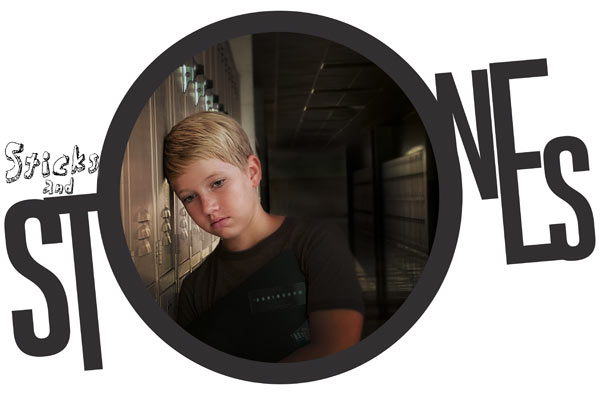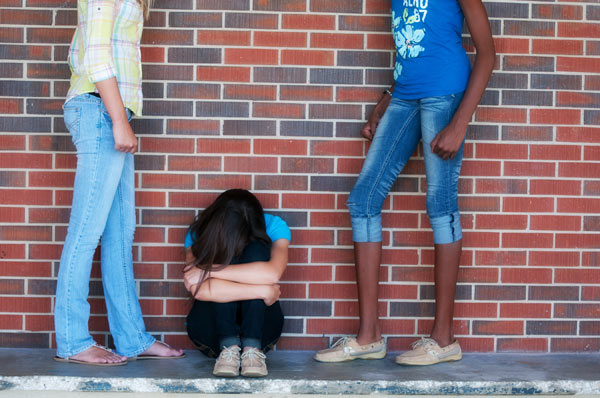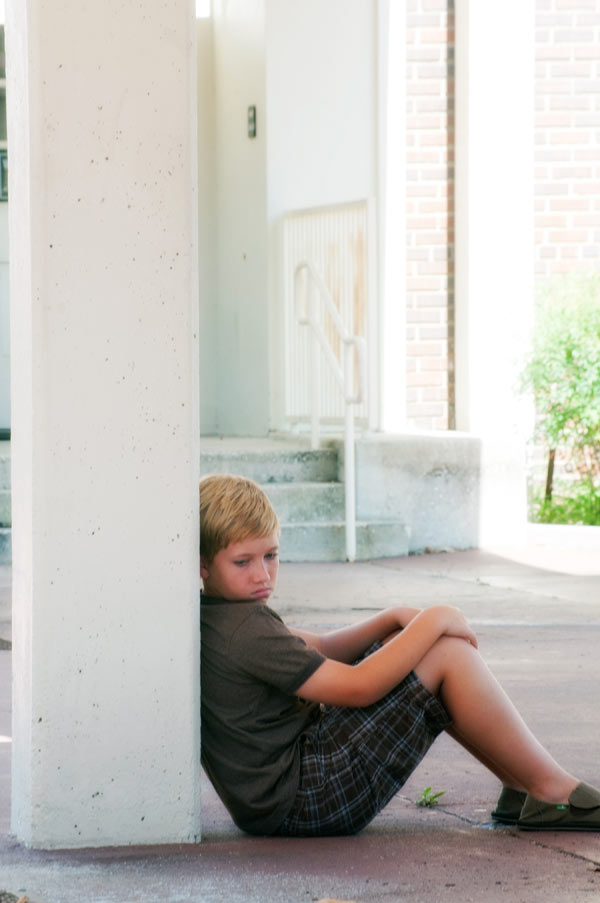
A sick feeling takes over Jake as he realizes tomorrow is Monday—the start of a new school week. Every morning when his alarm sounds, a sense of dread creeps over him, knowing what he’ll have to face that day, what he faces every day. The whispered taunts as he walks down the hall and the intentional shoves of the shoulder are bad, but the threats and the constant feeling of dread are the worst. He never knows when they’re going to corner him, when they’re going to push him up against the wall, take his stuff, harass him. Jake’s not sure what he’s done to be so hated. He’s the “new kid in school,” so maybe that’s it. He’s kind of on the heavy side, so that could be it, too. He’s heard them call him “fatty,” and they often steal his lunch. Jake’s dad works as a janitor, and he’s pretty sure he’s heard the word “poor” and “loser” when they’re flicking pencils, trash and anything else they can find at him. He doesn’t know what he’s done to deserve this, but he does know that he’s outnumbered, he’s hated and he’s alone. And he has to deal with this every single day. Jake is 12, and he doesn’t really see the point in trying to fight back anymore. Jake is a bullied kid.
Sticks and stones can break your bones, but words… words can do far more damage. Turn on the news and the headlines are shocking. “Bullied teen commits suicide” or “Area child attacked by bullies on school bus.” The most devastating of all are those cases—and the ones the news most often reports on—that end in the bullied child retaliating with violence—or worse, committing suicide.
Bullying has gained national attention in recent years, with some of the most extreme cases earning top billing on countless news broadcasts. But what is bullying? Who gets bullied, who does the bullying and what can we do to combat it?
Today’s parents may recall the bully of their youth as the big kid who threatened to feed them a “knuckle sandwich.” And although we might imagine bullies taking on the personas of iconic TV bullies—all while providing comic relief—bullying today is real and it’s no laughing matter.
Stopbullying.gov, a website managed by the U.S. Department of Health & Human Services and dedicated to educating and eliminating bullying among today’s youth, reports that two factors must come into play for a true bullying situation to occur. First, there has to be an imbalance of power, and physical size is not the only determining factor.
Lead Behavior Analyst for the Marion County School Board Adrienne Heruth-Ascierto explains that children can create a power imbalance in other ways, such as using their popularity to make another child feel like an outsider.
“When one child exhibits power over another, there is a risk that bullying can occur,” says Adrienne, who also points out the difference between bullying and typical childhood name-calling. “If two kids in the same grade, the same size with the same amount of friends call each other names, it’s not nice, but it’s not bullying since there isn’t an imbalance of power,” she says.
Along with that imbalance of power, the second criterion for an act to be considered bullying is that the behavior has to be repeated over time.
“If one child makes a mean comment to another one or two times, once again, it’s not nice, but it’s still not bullying—even if there is an imbalance of power because it did not occur repeatedly over a period of time,” Adrienne says.
Of course, to a parent whose child comes home in tears after being called “ugly” or “fat,” the criteria doesn’t matter. Being teased or harassed even once is one time too many. Advocates against bullying encourage parents to keep an open line of communication with their children from a young age and be supportive of their feelings and concerns rather than dismissing them as “typical” childlike behavior.
Mark Vianello, the executive director of student services for the Marion County Public School System, explains that bullying and any signs of potential bullying or harassing is not something that local schools take lightly. Unfortunately, most children will experience some form of name calling and the traditional teasing that goes along with growing up. But true bullying, even at its most trivial stage, is not something that parents or students should brush aside.
“Name calling and teasing isn’t nice, but it happens, especially with younger kids. But when it’s repeated over and over, it’s bullying, and that we don’t stand for,” he says, pointing out Marion County’s zero tolerance policy regarding the issue. And though true bullying must occur repeatedly, it only takes one time, one name-calling incident, one embarrassing moment to have a lasting psychological effect on a child.
Mark explains that the goal of the Marion County School Board is to create a positive climate that promotes learning. According to the Florida Department of Education, children who are bullied can suffer more than just hurt feelings. Depression, avoidance of social situations, loss of sleep, changes in eating patterns and declining grades are all signs that something serious is going on in your child’s life.
“Bullying can be subtle,” explains Adrienne. “You don’t always hear or see what’s going on. You have to look for the warning signs.” It’s the whispers, the jeers, the silent, condescending stares that go on out of view or earshot of teachers that do the most psychological damage.
Adrienne and Mark agree that the school environment plays an important role in how kids deal with the issue.
“Safety is our No. 1 priority,” Mark says. “Parents trust us to create a safe environment for their children to learn in, and kids have to feel safe coming here and comfortable coming to us if there is a problem.”

Jake feels like he can’t tell anyone what’s going on. He has no friends. The few kids he hung out with when he first started school here jumped ship as soon as he became a target. He can’t blame them. No one wants to hang out with a loser. But today, someone tripped him in the hall, and he hit his nose on the ground. With blood on his face, he ran to the restroom, away from the taunting masses in the hallway. He tried telling his dad, but he told him to “be a man, not a sissy.” If he tells a teacher at school, he’ll just look like a tattletale.
Over the past few years, the school board has implemented a number of techniques to address the issue of bullying. The goals are to reduce the number of disruptions among students and be proactive in eliminating possible occurrences of bullying before they begin.
Along with various presentations in the community to educate the public on the subject of bullying, the school board has formed a bullying committee to provide feedback through surveys that establish where and when the most instances of bullying take place in different schools and among what age groups. Computer modules were implemented to gather data from students who may not feel as comfortable discussing such issues face to face.
“Any time we get the sense from a student that there is an issue, whether it be from answers in a survey or through a computer module, we address it,” explains Mark. He feels that the on-campus support system in a school is the best way to help kids find a solution. “It sounds simple, and it is,” he says. “Building relationships with the students is the most important thing we can do. We need to let them know they can come to us and that someone cares.”
Schools across the nation have taken a hard stance against bullying. With the number of reported cases of anxiety, depression, violence and even suicide as a result of bullying escalating in recent years, the idea that kids will “grow out of it” or “get over it” is no longer an acceptable mindset when dealing with the issue.
One program that has been extremely successful both locally and on a national level is the voluntary Positive Behavior System (PBS). The system employs a “token economy” in which students are rewarded for good behavior rather than being punished for bad behavior.
Locally, Horizon Academy instituted the program during the 2011-12 academic school year and has reported a positive response.
“PBS has transformed our campus,” says Assistant Principal Paige Zadnik. For Horizon Academy, their expectation system became known as “The Big 3: Do what’s right, do your best and treat others the way you want to be treated.” The motto is posted throughout campus with very clear examples of how to implement these behaviors. PBS rewards the students who do live up to these standards.
“We want to catch you doing good,” explains Principal Troy Sanford. “If we see a student helping another or holding a door for someone or inviting someone to sit with them at lunch, we reward them with our version of the token,” he says. The token is physically nothing more than a piece of paper, but for Horizon students it’s as good as gold. Students can redeem them for everything from school supplies and snacks to special events and activities.
“We want students to feel good about doing the right thing and let them know that we notice when they are doing good instead of only punishing them for doing bad,” explains Parent Liaison Sara Llerena. She explains that, often, kids don’t even realize the ramifications of their behavior.
“Kids can have a mean sense of humor, and they hurt each other without realizing it, but PBS has been a vehicle to form relationships with our students and for the students to form relationships with each other,” she says.
And while true bullying was never a major issue at Horizon Academy, PBS has helped both students and parents become more aware of the behaviors that lead to bullying and the effects they can have on the targeted kids. The best piece of advice school officials offer to parents is to listen to their kids and take notice if they seem anxious or depressed.
“Today, kids have access to so much more information than we did years ago,” says Troy. “Parents need to communicate with both their children and us at the school.”

Jake just can’t seem to escape the bullying. If these guys were only at school, he could probably handle it, but now, they have his cell phone number. They send him texts throughout the night. And now he’s found out that they’ve hacked into his Facebook account and posted lies about him for the entire school to see. Tomorrow is going to be the worst day yet.
The evolution of social media and technology has impacted the means by which students interact. Kids today have access to information that previous generations never dreamt of having. But with that advancement also comes a downside.
“Facebook is a big issue,” says Corporal Juan Ocasio, student resource officer (SRO). “Kids take to heart what is put up there, and rumors can spread to hundreds of people in a matter of seconds.”
SROs are certified law enforcement officers, and every middle and high school in Marion County has SRO officers present. The officers work with the students both in the classroom and as counselors. They also investigate any criminal violations that take place in the school.
Corporal Ocasio has been with the Marion County Sheriff’s Office for 15 years and has worked as an SRO for the past five years. He explains that when using the legal definition, true bullying doesn’t occur very often in Marion County schools, but similar charges of harassment or battery do take place and can be just as damaging.
“Not everything fits the criteria for bullying, but just because it’s not bullying doesn’t mean it isn’t just as bad and can’t have the same emotional effect on a kid,” he says, pointing out that with the recent attention bullying has received in the media, people are more aware of the issue than ever before.
Cyberbullying goes beyond Facebook, and for parents who don’t know an iPad from an Android or a poke from a tweet, cyberbullying is a foreign concept. The worst part about cyberbullying, cyber-harassment, cyberstalking or any other type of cyber-related incident is that kids can’t escape it. It follows them home, it attacks them when they’re in their bedrooms, it haunts them before they go to sleep at night and it greets them when they wake up in the morning. Kids can begin to feel like there’s no escaping the tormenting.
“Kids are plugged in all of the time,” says Dan Kuhn of the Marion County Sheriff’s Office. “They can’t go home to get away from it. It’s on their phones; it’s everywhere.” He also notes that cyberbullying is a crime and can bring about criminal charges if warranted.
Cyberbullying can include direct attacks, such as sending threatening emails or text messages, or indirect attacks, such as posting embarrassing or lewd photos or comments of the victim without their knowledge, whether true or fabricated. Other incidents include stealing passwords, hacking into accounts or creating “bashing sites” where kids vote for the “ugliest” or “dumbest” student.
SROs are in the school to help educate students and their parents about all aspects of bullying and harassing and the consequences to both the bully, the victim and their families.
“We want to promote a safe environment for kids to learn in, and the best way to do that is to build relationships and rapport with the students so they feel comfortable talking to someone about it,” says Corporal Ocasio.
Together, the Sheriff’s Office, the Ocala Police Department and the Marion County School Board have combined efforts to establish a protocol for handling bullying issues.
“We prefer it be handled at the lowest level first with parents and teachers. We don’t want to put a mark on a student’s record,” Kuhn says.
At the first instance of a problem, an official warning is issued, and the signatures of the student, parent, school official and SRO officer are all required.
“We step in at the onset of a problem, and everyone knows the student has been officially warned and what the consequences are,” says Kuhn. He agrees with Mark Vianello that one of the best ways to address the bullying issue is to be proactive and stop problems before they start.

Jake’s decided the best way to deal with the threats is to just take it. The shoves against the wall don’t hurt that bad… He really doesn’t need to eat lunch at school. He can just eat when he gets home… He doesn’t need friends. He’s fine alone. And he might as well get used to it—he’ll probably be alone forever.
Although Jake’s story is fictional, it’s a story countless children experience daily. No one, especially children, should feel like they have to go through life alone.
While extreme cases of bullying like ones often seen in the media are indeed real problems for some school districts, Marion County does not have the same issue, thanks to the combined efforts of the school board, sheriff’s office and police department. Mark points out that of the 42,000-plus students in the district, there have been 276 substantiated bullying cases reported in the last year. He also adds that the number of bullying cases has been on a downward trend in recent years.
The professionals all offer the same advice to parents: Look for the warning signs, talk to your kids, talk to their teachers and monitor their online activity. Get involved in their lives, regardless of what they say. Ask them questions about what’s going on. In many cases, they are going to be embarrassed and deny anything is wrong, but don’t give up. Being proactive is the best way to ensure that your child never feels like there’s no way out.
Need More Info?
stopbullying.gov | stopbullyingnow.com | kidshealth.org | cyberbullying.info fldoe.org | cyberbullying.us | stopcyberbullying.org | ncpc.org/cyberbullying
Special thank you to models Harrison Knight, Brittany Shea, Kaela Sapp and Asha Thompson
Talent/Models provided by Ocala Models & Talent
*The story featured throughout this article is fictional and not based on any particular person or events.






